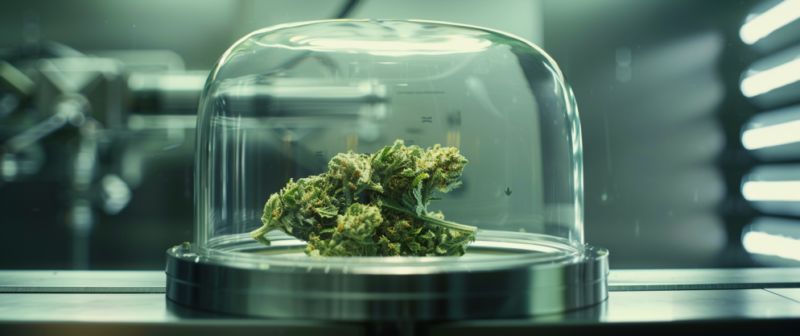What is Delta 8 Used for
Delta 8, a cannabinoid found in cannabis, has gained popularity for its various uses. So what is Delta 8 used for?
It is utilized in different forms like vape cartridges, edibles, tinctures, topicals, and capsules for recreational, medicinal, and industrial purposes.
We discuss the different forms of Delta 8, its effects on the mind and body, and its legal status to uncover its versatility and common uses in today’s market.
What Is Delta 8?
Delta 8 is a chemical compound classified as a cannabinoid and is an isomer of tetrahydrocannabinol (THC), known for its milder psychoactive effects compared to Delta-9 THC.
Delta 8 contains a double bond on the eighth carbon chain, giving it unique properties that differentiate it from Delta-9 THC. This variance in structure leads to Delta 8 binding more selectively to the endocannabinoid receptors in the body, resulting in a smoother and more subdued high.
When consumed, Delta 8 is reported to offer a less intense and overwhelming psychoactive experience than Delta-9 THC, making it a popular choice for those seeking a more gentle cannabis encounter. Its milder nature appeals to users looking for relaxation and euphoria without the potential stress or paranoia that can sometimes accompany Delta-9 THC.
Is Delta 8 synthetic?
Nearly all the Delta 8 you can buy is made in labs with cannabidiol (CBD) from hemp plants, along with several chemicals. It’s much more potent than the Delta 8 found in nature. Because the FDA doesn’t regulate the chemical process to make Delta 8, these products aren’t tested for safety or quality. Harmful chemicals could be used to make them or created during the process.
What is Delta 8 Used for?
Delta 8 THC, a cannabinoid found naturally in hemp and cannabis plants, is increasingly available in various products such as gummies, vape cartridges, and capsules, especially in states where it’s legal. Its popularity is soaring, with these items sold in various outlets, from specialty dispensaries to convenience stores.
Recreational Use
Delta 8 is often used recreationally for its mild psychoactive effects that promote relaxation and improve mood, but users should be aware of potential confusion and issues with drug tests.
Delta-8-THC (delta-8-tetrahydrocannabinol) is a cannabinoid found in cannabis plants. While it shares similarities with delta-9-THC, the primary psychoactive compound in marijuana, delta-8-THC is considered to be less potent. Here are some key points about its recreational use:
Effects and Experience
- Milder High: Users often report a less intense high compared to delta-9-THC, making it appealing for those who seek the psychoactive effects without the stronger side effects like stress or paranoia.
- Relaxation: Delta-8-THC is known for its calming and relaxing effects. It can induce a sense of euphoria and well-being.
- Clear-headedness: Many users claim that delta-8 provides a clearer high, allowing for better focus and cognitive function compared to delta-9-THC.
Legal Status
- Federal Legality: The legality of delta-8-THC is complex. Under the 2018 Farm Bill, hemp-derived cannabinoids, including delta-8-THC, are technically legal. However, some states have moved to ban or restrict its sale.
- State Laws: Legality varies significantly by state. Some states have explicitly banned delta-8-THC, while others allow its sale and use. It’s important to check local regulations.
Availability
- Products: Delta-8-THC is available in various forms, including gummies, vapes, tinctures, and flower. The market for these products has grown rapidly, especially in states where delta-9-THC is restricted.
- Retail: Delta-8 products can be found in many online stores, specialty shops, and dispensaries where permitted by law.
Consumption Methods
- Inhalation: Vaping delta-8-THC provides quick onset of effects, making it a popular choice for recreational users.
- Edibles: Gummies and other edibles offer a longer-lasting high but take longer to take effect.
- Sublingual: Tinctures are taken under the tongue and provide a middle ground in terms of onset and duration of effects.
Safety and Precautions
- Dosage: Start with a low dose to gauge your tolerance, as the effects can vary between individuals.
- Purity and Quality: Due to the unregulated market, product quality can vary. Look for third-party lab-tested products to ensure purity and safety.
- Side Effects: Potential side effects include dry mouth, red eyes, and in rare cases, dizziness or nausea. Always use responsibly.
Industrial Use
In the industrial sector, Delta 8 finds applications in agriculture improvement and manufacturing, particularly in the packaging and labeling processes, and even as a potential pesticide.
Delta-8-THC, primarily known for its recreational and medicinal applications, is not widely recognized for industrial uses. Unlike CBD (cannabidiol) and hemp, which have broad industrial applications, delta-8-THC’s psychoactive properties limit its use to consumer-focused products. However, there are some indirect ways it may be tied to industrial processes:
Extraction and Production
- Cannabinoid Extraction: The processes and technologies used to extract delta-8-THC can be considered industrial. Advanced extraction techniques, such as CO2 extraction, are utilized to isolate and convert cannabinoids from hemp and cannabis plants.
- Chemical Conversion: Delta-8-THC is often derived from CBD through an isomerization process. This involves chemical reactions and purification steps that are part of industrial chemistry.
Applications in Consumer Products
- Pharmaceuticals: Although not an industrial use in the traditional sense, delta-8-THC’s potential therapeutic benefits could lead to its inclusion in pharmaceutical formulations, which involve industrial-scale production and distribution.
- Nutraceuticals and Wellness Products: Delta-8-THC might be used in nutraceuticals or wellness products, requiring industrial-scale manufacturing and packaging.
Hemp Industry
- Hemp Cultivation: While not directly related to delta-8-THC, hemp cultivation for CBD extraction (from which delta-8-THC can be synthesized) is an industrial-scale agricultural activity.
- Biomass Utilization: The residual biomass from hemp and cannabis extraction processes can be used for other industrial purposes, such as biofuels, construction materials, and textiles.
Research and Development
- Cannabinoid Research: Industrial R&D facilities are involved in studying cannabinoids, including delta-8-THC, to understand their properties, potential applications, and safety profiles. This research can advance extraction methods, product formulations, and new applications.
How Do People Use Delta 8?
Delta 8-tetrahydrocannabinol, commonly known as Delta 8 or D8, is a cannabinoid found in cannabis. It’s structurally similar to Delta-9-tetrahydrocannabinol (Delta-9 or THC), the primary psychoactive component of cannabis, but with some differences in effects and legality.
People use Delta 8 in various ways, including:
- Smoking or vaping: Similar to Delta-9 THC, Delta-8 can be smoked or vaped. Many users prefer vaping for a more controlled dosage and reduced harm compared to smoking.
- Edibles: Delta 8 can be infused into various edible products, such as gummies, chocolates, or beverages. This method provides a discreet and longer-lasting effect than smoking.
- Tinctures and oils: Delta 8 can also be consumed orally by using tinctures or oils. These products are usually placed under the tongue for sublingual absorption.
- Topicals: Some users apply Delta 8-infused creams, lotions, or balms topically to alleviate localized discomfort or irritation.
- Capsules: Delta 8 can be encapsulated into pills or capsules for precise dosing and convenient consumption.
What Are The Potential Effects Of Delta 8?
Delta 8’s effects are multifaceted, encompassing psychoactive, physical, and therapeutic impacts. They are primarily influenced by its interaction with the brain and the endocannabinoid system.
-
Psychoactive Effects
Delta 8 is known for its mild psychoactive effects. It induces a sense of euphoria and relaxation without significantly impairing cognitive function or consciousness.
These effects make Delta 8 popular for individuals seeking a gentle uplift without the intensity often associated with other cannabinoids. Users usually report a calming effect on their mind and body, allowing for a pleasant and mellow experience. The impact on cognitive function is notable, with many users describing improved focus and clarity while under the influence of Delta 8.
-
Physical Effects
Regarding discomfort relief, Delta 8 interacts with the body’s endocannabinoid system, helping to alleviate discomfort and promote relaxation. This can be particularly beneficial for individuals experiencing chronic discomfort or irritation. Its muscle relaxation properties can help ease tension, fostering a sense of calmness and comfort.
Delta 8’s anti-microbial effects can be essential for managing conditions such as arthritis or other irritation disorders by reducing swelling and discomfort. Its ability to stimulate appetite can benefit individuals undergoing therapies that impact their hunger levels, aiding in maintaining a healthy diet and overall well-being.
-
Therapeutic Effects
Therapeutically, Delta 8 is valued for reducing stress, managing chronic discomfort, controlling nausea, and improving sleep quality.
Delta 8, a cannabinoid with promising potential, has gained attention for its ability to provide relaxation and mental clarity, making it a popular choice for individuals seeking natural remedies. Many users report feeling a sense of calmness and stress relief after consuming Delta 8 products. Its analgesic properties make it effective in alleviating various types of discomfort, offering a desirable alternative to traditional discomfort management medications.
What Are The Different Forms Of Delta 8?
Delta 8 is available in various forms, including vape cartridges, edibles, tinctures, topicals, and capsules, each offering unique methods of consumption and effects.
-
Delta 8 Vape Cartridges
Delta 8 vape cartridges provide a quick and efficient way to experience the effects through inhalation, offering rapid onset of effects via the respiratory system.
When inhaling Delta 8 vape cartridges, the vaporized Delta 8 THC is efficiently absorbed into the bloodstream through the lungs, leading to a faster onset compared to other consumption methods—the Delta 8 compound interacts with the body’s endocannabinoid system, which regulates various physiological functions.
It is important to note that while vaping provides a rapid delivery of effects, there may be concerns regarding the impact on the respiratory system. Vaping involves inhaling heated aerosolized substances, which can potentially irritate the lungs over time. Proper moderation and choosing high-quality products are essential for minimizing potential respiratory risks.
-
Delta 8 Edibles
Delta 8 edibles, consumed through the digestive system, have a delayed onset but offer longer-lasting effects, making dosage control essential for optimal results.
When consuming Delta 8 edibles, they need to pass through the digestive system before entering the bloodstream, which can result in a slower onset compared to other consumption methods, such as vaping. This delayed onset is often favorable for individuals seeking a more gradual and sustained experience.
It’s crucial to note that the impact duration can vary depending on factors such as metabolism and tolerance.
One of the critical advantages of Delta 8 edibles is the ease of dosage control. Unlike some forms of cannabis consumption, such as smoking, edibles offer a more precise way to manage the amount of Delta 8 consumed.
-
Delta 8 Tinctures
Delta 8 tinctures are administered sublingually, allowing for quick absorption and flexibility in concentration and dosage.
This sublingual administration method involves placing a few drops under the tongue, quickly absorbing the compound into the bloodstream through the mucous membranes. This route bypasses the digestive system, enabling a faster onset of effects than traditional oral ingestion. The flexibility in concentration and dosage of Delta 8 tinctures allows users to personalize their experience based on their needs and preferences, making it a versatile option for those seeking targeted results or experimenting with different strengths.
-
Delta 8 Topicals
Delta 8 topicals are applied directly to the skin, providing localized relief for muscle discomfort and irritation without the psychoactive effects.
These topicals, which come in various forms like creams, balms, and lotions, are designed to target specific areas of discomfort. By interacting with the body’s endocannabinoid system, Delta 8 binds to receptors in the skin and muscles, helping to alleviate discomfort and reduce irritation. The beauty of these products lies in their ability to offer a more targeted approach to discomfort management, unlike ingestible forms of Delta 8 that impact the entire body.
Many users appreciate that Delta 8 topicals can be applied directly to the affected area, allowing quicker absorption and relief. This makes them a convenient option for those looking to address localized discomfort efficiently. Whether dealing with sore muscles after a workout or seeking relief from chronic discomfort, these topicals offer a natural, non-invasive solution to promote overall well-being.
-
Delta 8 Capsules
Delta 8 capsules offer convenient and precise dosage through oral administration, with effects influenced by the body’s metabolism.
One of Delta 8’s main advantages is its ease of consumption. Unlike other forms, capsules are simple to take and don’t require any additional tools or preparation. This makes them a hassle-free option for those looking for a convenient way to incorporate Delta 8 into their routine.
The precise dosage in each capsule ensures consistency in the amount consumed, allowing users to maintain control over their intake. This can be particularly helpful for individuals needing specific dosages for desired effects or preferring to avoid any guesswork regarding their supplements.
Another important aspect to consider is the influence of metabolism on the effects of Delta 8. As metabolism varies from person to person, it plays a role in how quickly the body processes Delta 8, affecting the onset and duration of its effects. Understanding this interplay can help users tailor their dosage and timing for optimal results.
Is Delta 8 Legal?
The legality of Delta 8 is complex and varies based on federal, state, and international laws. Key regulations stem from the Agriculture Improvement Act of 2018 and the Controlled Substances Act.
-
Federal Laws
At the federal level, Delta 8’s legality is influenced by the Agriculture Improvement Act of 2018, which is overseen by the Food and Drug Administration and the Drug Enforcement Administration.
The Agriculture Improvement Act of 2018, commonly known as the 2018 Farm Bill, legalized hemp-derived products containing less than 0.3% Delta-9-THC at the federal level. The legality of Delta 8 remains a subject of debate due to a loophole that may or may not cover it under the legal definition of hemp-derived products.
The FDA has raised concerns about the safety and potential health risks associated with Delta 8 products, hinting at the need for further regulation. On the other hand, the DEA has not explicitly classified Delta 8 as a controlled substance under the Controlled Substances Act, leaving a level of ambiguity in its legal status.
-
State Laws
State laws regarding Delta 8 vary significantly, with some states implementing strict regulations and others allowing more permissive use, requiring consumers to stay informed about local compliance and restrictions.
Individuals must recognize that what may be legal in one state regarding Delta 8 products could be prohibited entirely in another. The federal legality of hemp-derived Delta 8-THC adds another layer of complexity, making it essential for consumers to be well-versed in both state and federal laws. For instance, while some states have accepted the growing market for Delta 8 products, others have taken a more cautious approach, imposing strict regulations or outright bans. Considering this regulatory landscape necessitates thorough research and understanding to ensure compliance and avoid legal repercussions.
-
International Laws
Internationally, the legality of Delta 8 varies widely, with each country having its regulations, impacting its availability and use in the global market.
Delta 8, a derivative of hemp, falls into a legal gray area in many nations, as it is not explicitly classified as either legal or illegal. This ambiguity has led to inconsistencies in how Delta 8 products are regulated and sold across different regions. In some countries, such as the United States, Delta 8 is considered legal if derived from hemp with less than 0.3% Delta-9 THC, while in others, it is strictly prohibited due to its psychoactive properties.
Final Thoughts – What is Delta 8 Used for
Delta 8 offers versatile applications ranging from recreational use to therapeutic benefits, though varying legal considerations and regulations bind its usage.
One of the critical aspects of Delta 8 is its potential to provide a more mild psychoactive experience compared to its close relative, Delta-9 THC. This makes it appealing to those seeking a gentler high or looking for potential therapeutic effects without the intense psychoactive impact. Further, Delta 8 has shown promise in providing relief from nausea, discomfort, and stress, making it a popular choice among medical cannabis users.
It’s essential to note that Delta 8’s legal status can vary significantly depending on state laws and regulations. This can lead to confusion and potential legal risks for consumers and sellers alike. As with any cannabis-related product, it’s crucial to stay informed about the laws in your area to ensure compliance and avoid any legal repercussions.
Despite the legal complexities, the growing interest in Delta 8 highlights its potential to carve out a unique space in the cannabis market, catering to both recreational and medicinal users. Whether used for relaxation or to alleviate symptoms, Delta 8 offers a promising middle ground between recreational enjoyment and therapeutic benefits.
Frequently Asked Questions
Is delta 8 used for medical purposes?
While there is ongoing research on the potential medical benefits of delta 8, it is not currently approved for medical use. It is primarily used in the production of CBD products and for recreational purposes.
What are the effects of delta 8?
Delta 8 is known to produce a subtle high, with less intense psychoactive effects compared to delta 9 THC. It can also have calming and uplifting effects, making it a popular choice for those looking for a milder cannabis experience.
Can delta 8 be used for discomfort relief?
Limited research exists on Delta 8’s discomfort-relieving properties, but some users have reported that it helps with discomfort management. However, it is not approved for medical use and should not be used as a substitute for medical therapy.
Can delta 8 be used as a substitute for delta 9 THC?
Delta 8 is often used as a substitute for delta 9 THC, as it produces similar effects without the intense psychoactive properties. However, it is important to note that delta 8 is still psychoactive and should be used responsibly.


